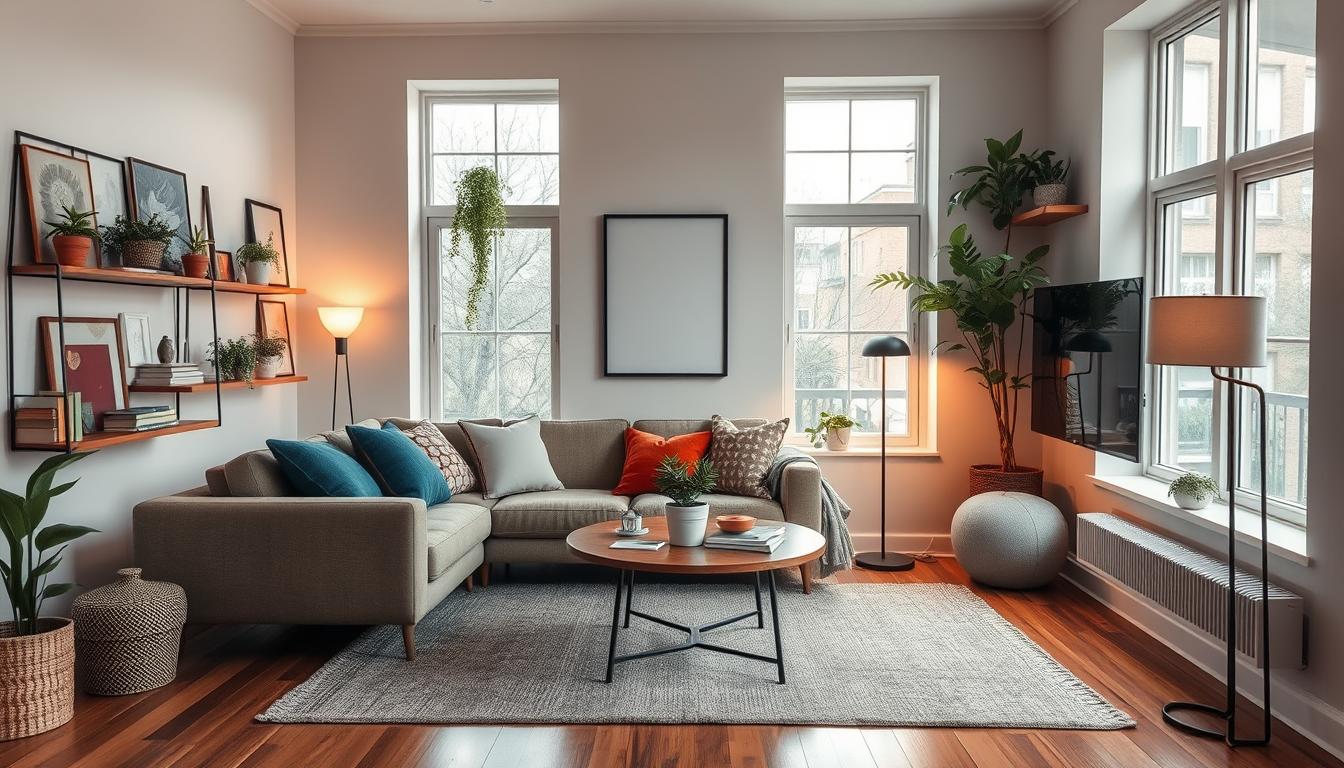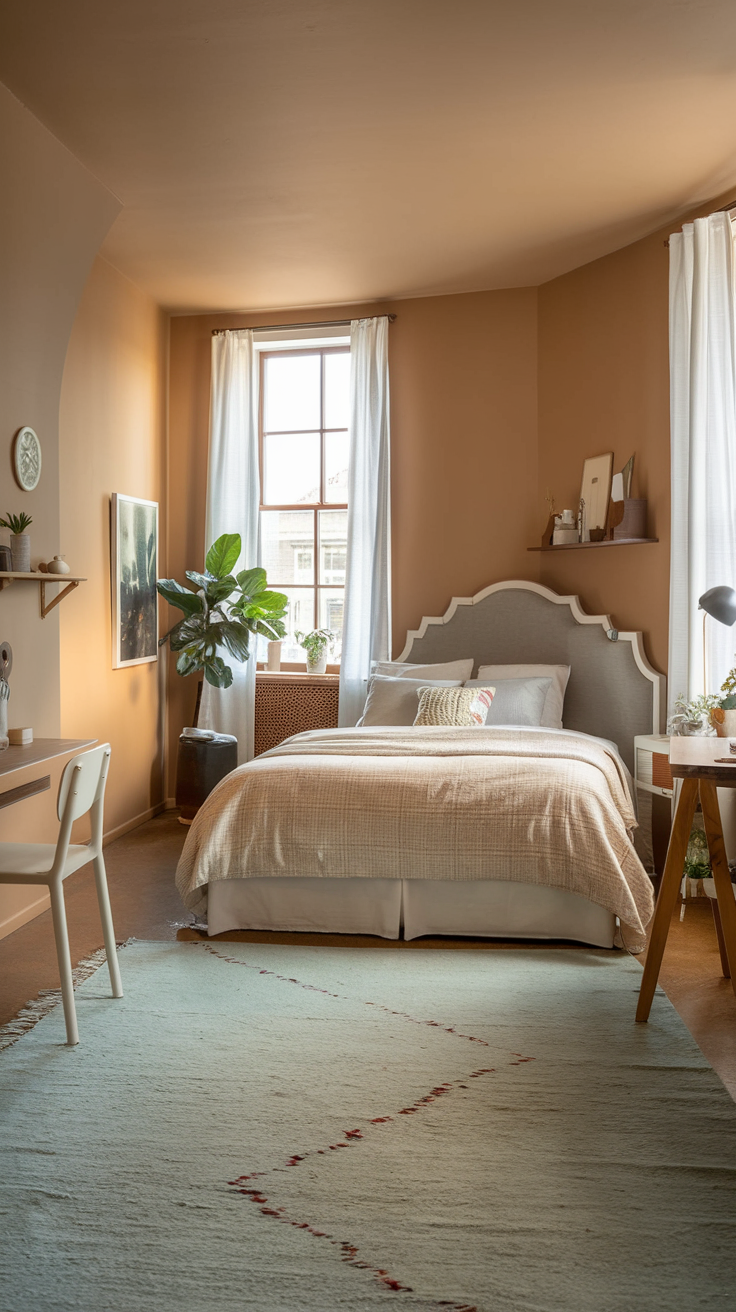Living in a small space can be tough, but it’s not impossible. I’ve learned how to make a cozy sitting area in a tiny room. I’m excited to share some clever tricks that can make your small living room look bigger and feel more welcoming.
We’ll explore how our brains see space and how to use color, lighting, and furniture to make a room feel bigger. You’ll discover ways to arrange furniture, use storage, and even pick textiles that make your room seem larger. Say goodbye to feeling cramped and hello to a room that feels bigger than it is!
Key Takeaways
- Leverage visual illusions to make a small living room appear larger and more inviting.
- Understand the psychology of space perception and how it can be manipulated through design choices.
- Discover strategic furniture placement and storage solutions to optimize the use of limited square footage.
- Utilize lighting, color, and textiles to create the illusion of depth and openness.
- Implement practical, space-saving techniques to make the most of your compact living room.
Understanding Space Psychology in Small Living Areas
As a designer, I know that making a small living area cozy and nice to look at is key. It’s all about understanding how we see space, the weight of things, and the power of color. These elements are crucial for a room’s feel and function, especially in tight spaces.
The Impact of Visual Weight on Room Perception
Visual weight is how our brains see the heaviness or lightness of objects in a room. Knowing how to place furniture and decor can change how a room feels. Light, small items can make a room feel airy, while big, heavy ones can feel cozy and snug.
How Human Brain Processes Spatial Information
- Our brains always check the space around us, looking at depth, size, and shape.
- By knowing how our minds see space, we can design small areas to feel bigger and welcoming.
- Things like where we put furniture, lighting, and mirrors can change how we see a room’s size.
Color Psychology in Space Management
Color is a big tool for designers in small spaces. Different colors can change how we see a room’s size and feel. Warm colors can make a space feel cozy, while cool colors can make it feel bigger. Using color wisely can make a small area feel open and comfy.
| Color Effect | Room Perception |
|---|---|
| Warm Colors (Red, Orange, Yellow) | Cozy, Intimate |
| Cool Colors (Blue, Green, Purple) | Airy, Expansive |
Designers can make small areas feel bigger and more welcoming by understanding space, weight, and color. Using these ideas is key to making the most of even the smallest spaces.
Small Space Living Room Ideas cozy living room small apartment
Living in a small apartment means making the most of every inch. It’s all about finding small apartment ideas and compact living solutions. This way, even the tiniest living room can become a cozy living room that feels just right for you.
Using furniture that does more than one thing is a great idea. For instance, an ottoman with storage can be a footrest and a place to hide things. A small sectional sofa with a chaise can fit a lot of people without taking up too much space.
Think up high to save space. Use wall shelves, floating media units, and tall bookcases. Mirrors can also make a room look bigger by reflecting light and images.
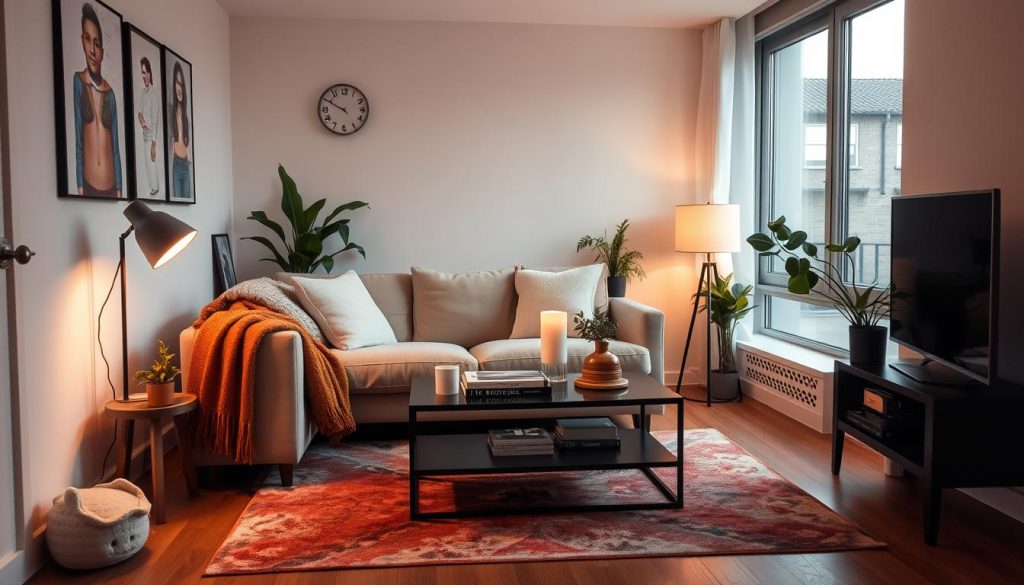
Choosing light colors and smart lighting can make a big difference. Soft blues, grays, and wood tones are calming. Mix recessed lights, floor lamps, and task lights for a cozy feel.
By combining looks and uses, you can make a cozy living room that’s perfect for you, no matter the size. With a bit of creativity and smart small apartment ideas, your small space can become a cozy retreat.
Strategic Furniture Placement for Maximum Space Optimization
When you have a small living room, the right furniture arrangement can change everything. Understanding how to manage traffic flow, create focal points, and achieve balance is key. This way, you can make the most of your space and turn it into a cozy, inviting area.
Creating Traffic Flow Patterns
It’s important to know how people move in your living room. Place furniture to guide people smoothly through the space. Put big pieces, like the sofa, along the walls to keep the middle open.
Use smaller items, like accent chairs or side tables, to create different areas. But make sure they don’t block the way.
Focal Point Establishment
A focal point is vital for adding interest and direction in a small room. It could be a bold wall, a striking artwork, or a fireplace. Set up your furniture to highlight this point, making the room feel welcoming.
Make sure your furniture complements and highlights the focal feature.
Balance and Symmetry Principles
Keeping your room balanced and symmetrical can make it look bigger and more harmonious. You can use a symmetrical or asymmetrical layout, depending on what looks best. Think about the size and weight of your furniture to match the room.
Try out different setups until you find the perfect balance for your space and style.
“Carefully planned furniture placement can transform a cramped living room into a cozy, functional haven.”
By using these smart furniture arrangement tips, you can make your small living room feel bigger and more welcoming. It will become a comfortable and visually appealing space.
Mirror Magic: Amplifying Space Through Reflective Surfaces
Mirrors have a special power to make rooms seem bigger. By placing mirrors wisely, you can make a small sitting area look larger and more open. This trick is especially useful for small spaces, making them feel brighter and more spacious.
The secret to mirror magic is understanding how our brains see space. Mirrors work as reflective decor to change how we see depth and distance. This makes even the smallest areas feel surprisingly roomy.
One smart way to use mirrors is to place them opposite windows or light sources. This trick makes the room look bigger and brighter. You can also place mirrors next to furniture or walls to make the room seem even larger. It’s like magic, making the room appear bigger than it really is.
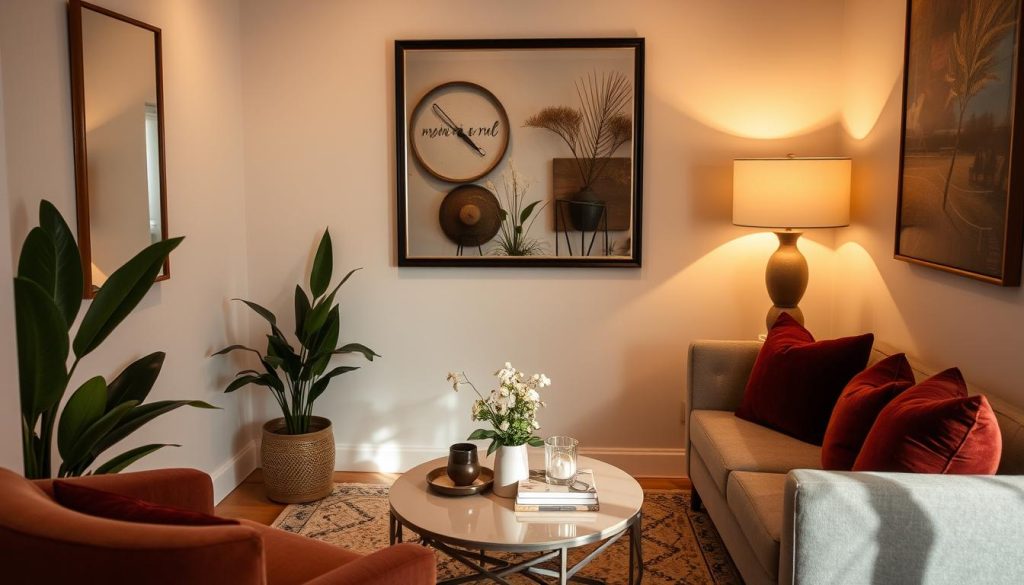
Try out different ways of placing mirrors and using reflective decor in your small sitting area. With mirrors, you can turn a tight spot into a cozy and spacious retreat.
Light Layering Techniques for Depth Creation
Creating a cozy small living space needs a smart lighting plan. Light layering tricks can make your space look bigger. Let’s explore how to make your tiny home feel light and spacious.
Natural Light Maximization
Using natural light can greatly improve a small space. Try placing mirrors by windows to reflect and increase light. Use sheer curtains to soften sunlight and add a breezy feel. Make sure furniture doesn’t block the light.
Artificial Lighting Strategies
Artificial lighting is key for depth and dimension. Mix different lights like recessed, wall sconces, and task lamps. This creates layers and defines areas, making your space feel deeper.
Shadow Management
Light and shadow control is vital for depth. Place lights to avoid harsh shadows that make rooms feel tight. Use dimmers to adjust light and shadows for the perfect contrast.
With these light layering tips, your small living room can become a cozy, inviting space. It will feel larger and more open, thanks to clever lighting.
Color Schemes That Make Rooms Feel Larger
Color psychology is key in making small living areas feel bigger. The right color choices can change a tight space into a room that feels huge. Let’s look at some color strategies that can make your small living room look bigger.
Using light colors is a classic trick. Light colors like soft blues, gentle greens, and warm whites make rooms feel airy. These light colors reflect light, making the room look bigger than it is.
Monochromatic schemes are also effective. Sticking to one color makes the room feel more connected. Adding different shades of the same color helps the eye move smoothly through the space.
Light colors and monochromatic schemes are great, but bold color accents can also help. Placing bold colors in key spots can make the room feel deeper and more dimensional.
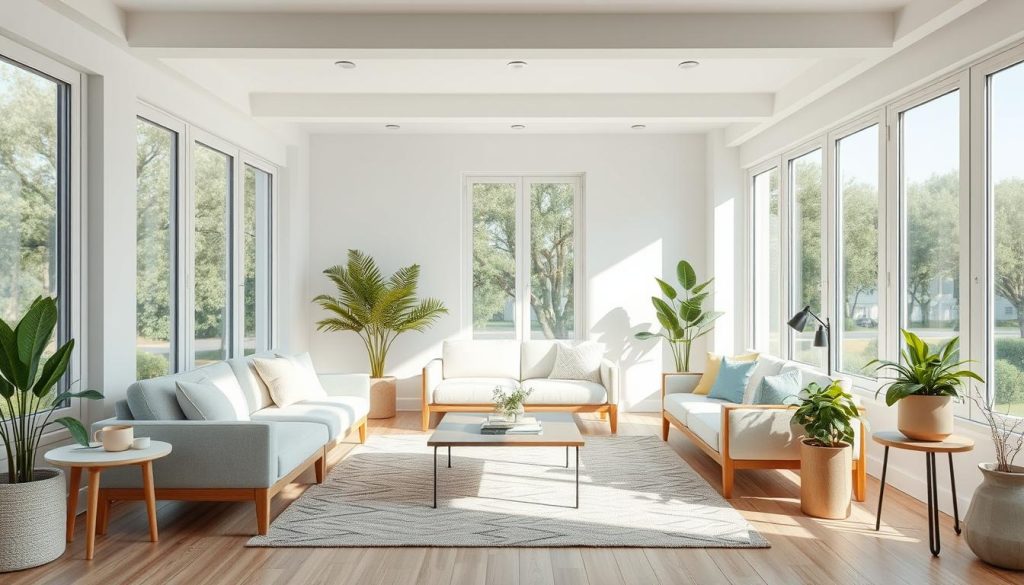
“The right color choices can make a small living room feel larger, more inviting, and infinitely more comfortable.”
The secret to a bigger small living room is understanding color psychology. Using light colors, monochromatic schemes, and smart visual expansion can create a larger, more open space.
Vertical Space Utilization: Going Up When You Can’t Go Out
When your living room is small, look up, not out. Using vertical space can make your room feel bigger. It also keeps the cozy feel you love. Let’s look at smart ways to use your small sitting area’s vertical space.
Wall-Mounted Solutions
Wall-mounted furniture changes the game for small spaces. You can have floating shelves or wall-mounted TV stands. These keep your floor free while offering lots of storage and display.
Think about tall, narrow shelves on your walls. They can hold books, decor, and more. This way, you don’t lose floor space.
Ceiling-Height Optimization
Don’t ignore the space above you! Use your ceiling height with tall, slim shelving or ceiling storage. Tall bookcases or built-ins can turn unused space into something useful and nice to look at.
| Vertical Storage Solutions | Benefits |
|---|---|
| Wall-mounted shelves | Maximizes floor space, creates visual interest |
| Ceiling-height bookcases | Utilizes vertical space, provides ample storage |
| Floating wall-mounted TV stand | Frees up floor space, creates a clean, minimalist look |
With these vertical storage ideas, your small living room can become cozy and organized. It will feel bigger than it is. Remember, going up is the best option when you can’t go out!
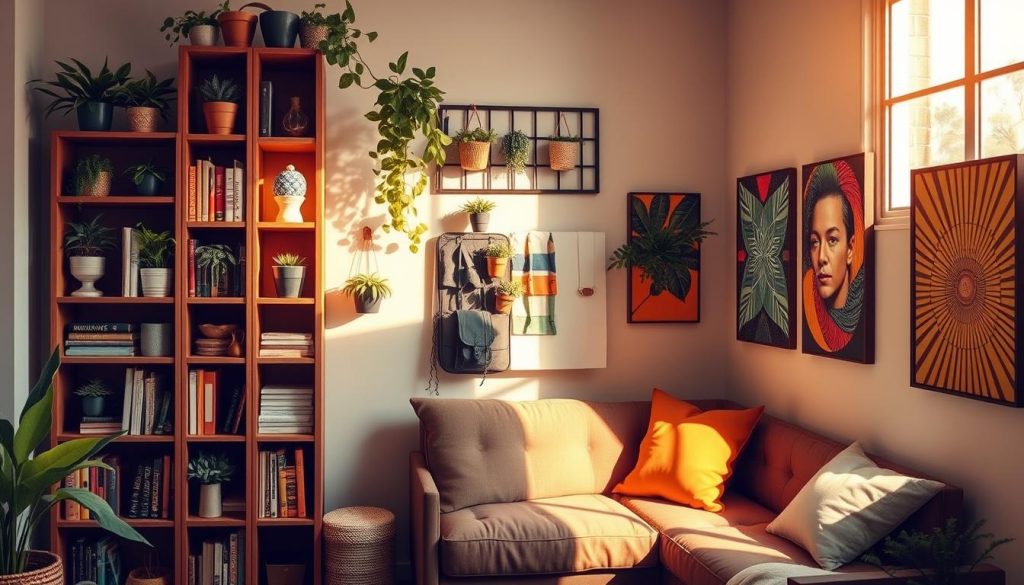
Multi-Functional Furniture Selection Guide
In small living spaces, every inch matters. That’s where multi-functional furniture shines. These designs help homeowners and renters use their space wisely, without losing style or comfort.
Choosing the right multi-functional furniture is key. Look for convertible furniture that can do more than one thing. A sofa that turns into a bed or a coffee table with secret storage can change a tiny apartment.
- Choose space-saving designs that use the wall, like shelves or murphy beds that fold up.
- Find dual-purpose items like ottomans with storage or tables that nest together.
Multi-functional furniture is great because it changes with your life. It works for guests, work, or just chilling. These smart pieces adjust to fit your needs.
| Multi-Functional Furniture Type | Key Benefits | Example Products |
|---|---|---|
| Convertible Sofas | Provides seating and sleeping space in one | Futon, sleeper sofa, sectional with chaise |
| Storage Ottomans | Offers hidden storage and doubles as a coffee table or extra seating | Upholstered ottomans, trunk ottomans |
| Wall-Mounted Shelves | Maximizes vertical space for storage and display | Floating shelves, wall-mounted bookcases |
By picking the right multi-functional furniture, you can make a cozy, efficient space. Use convertible furniture, space-saving designs, and dual-purpose items to turn a small area into a stylish, functional spot.
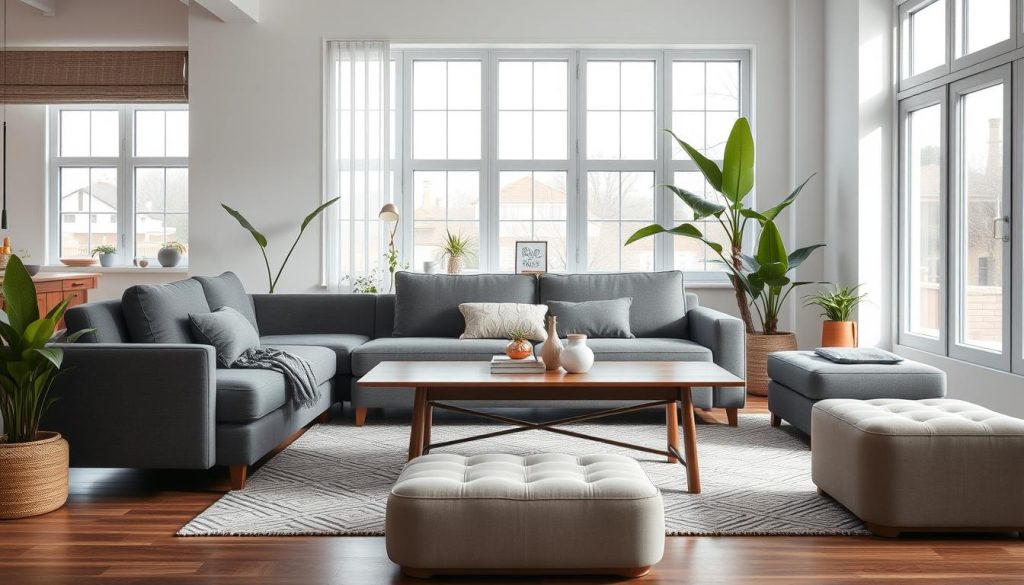
Scale and Proportion: Choosing Right-Sized Furniture
Finding the right furniture size is key for a small living room. The right pieces make the room look bigger. The wrong ones can make it feel tight and cluttered. I’ve learned some tips to help with this, making my small space feel bigger.
Furniture Height Considerations
The height of your furniture matters a lot. Tall pieces can make a room look smaller. Choose low-profile, compact designs instead. Furniture that matches the room’s size can make it look bigger and more open.
Visual Weight Management
The look of your furniture also affects how a room feels. Light, airy furniture makes a room feel bigger. Heavy, bulky pieces can make it feel cramped. Think about the visual proportion of each piece for a balanced look.
| Furniture Characteristic | Impact on Perceived Space |
|---|---|
| Tall, Bulky Pieces | Can make a room feel cramped and overwhelming |
| Low-Profile, Compact Designs | Create an illusion of spaciousness and openness |
| Lightweight, Airy Furniture | Enhances the perception of a larger, more open layout |
By choosing furniture with the right furniture scale and visual proportion, you can make a cozy room feel larger. It’s about finding the right balance and using design wisely.
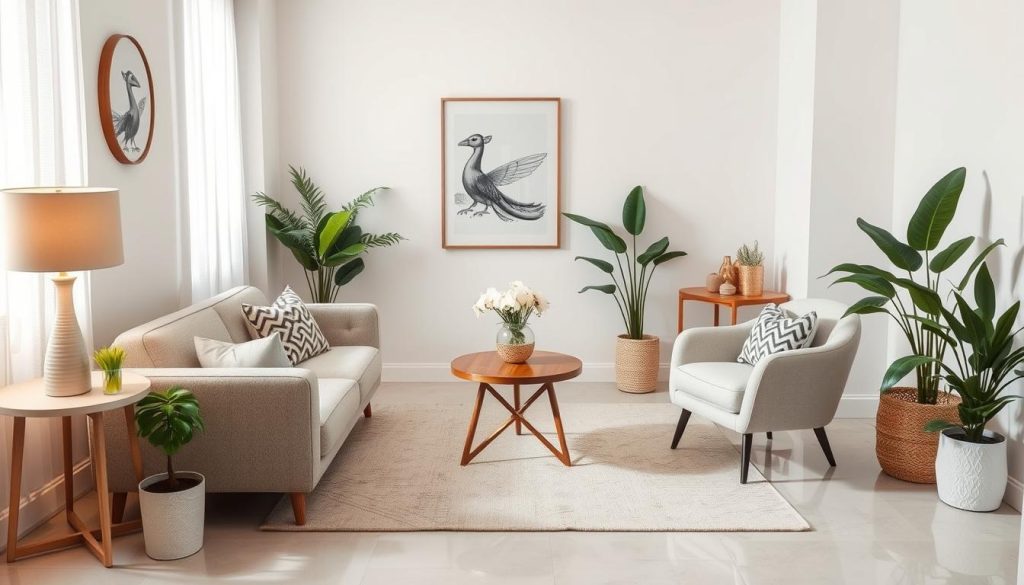
Textile Tricks: Using Fabrics to Create Depth
Decorating a small living room can be a challenge. But, using fabrics wisely can make a big difference. From curtains to rugs, textiles can change how a space looks and feels.
Curtain Placement for Depth Illusion
Hang curtains from floor to ceiling to make a room feel taller. Place the rod as close to the ceiling as you can. Choose lightweight, flowing fabrics to avoid overwhelming the space.
By framing windows with curtains, you create depth and grandeur. This trick makes the room feel bigger and more impressive.
Rug Sizing and Placement
The right rug size and placement can greatly impact a small room. Avoid small rugs that look lost. Instead, pick a rug that goes beyond your furniture.
This anchors the seating area and makes the room feel more connected. Try layering smaller rugs or runners over a larger rug for more texture and depth.
Textile Layering for Depth
- Use throw pillows and blankets in different patterns and textures for depth and layers.
- Mix fabrics like velvet, linen, and silk for visual interest.
- Hang wall tapestries or textured artwork for more depth and dimension.
By using fabric textures, curtain placement, and rug sizing, you can make a small room cozy and inviting. Try these tricks to create the illusion of depth and make your space feel larger than it is.
| Textile Technique | How it Creates Depth |
|---|---|
| Floor-to-Ceiling Curtains | Draws the eye upward, making the room feel taller |
| Oversized Rugs | Anchors the seating area and makes the room feel more cohesive |
| Textile Layering | Adds visual interest and a sense of depth through texture and pattern |
Remember, the key to using textiles for depth in a small room is to experiment and find the right balance. With a little creativity, you can turn your cozy space into a visually stunning and larger area.
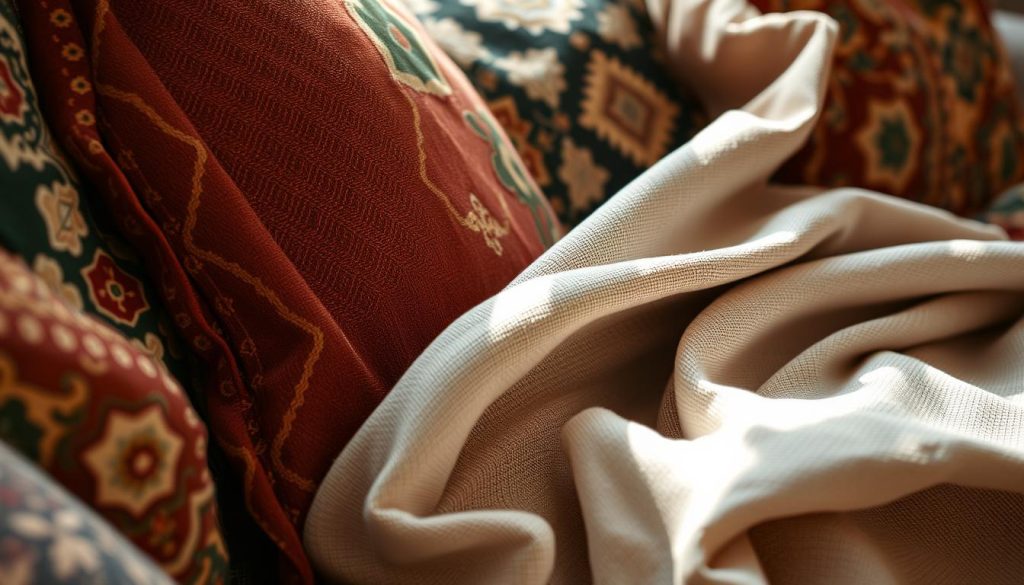
Storage Solutions That Don’t Compromise Style
Looking for a clutter-free home doesn’t mean you have to sacrifice style. With a bit of creativity, you can find storage that’s both useful and stylish. It will make your home look better and feel more organized.
Hidden Storage Ideas
Hidden storage can really change your space. Here are some ideas for your small living room:
- Ottomans and benches with built-in storage compartments
- Lift-top coffee tables that reveal hidden storage beneath
- Wall-mounted shelves or cubbies that conceal clutter behind closed doors
- Floating nightstands or side tables with discreet drawers or compartments
Decorative Storage Options
There are many decorative storage options that can make your living room stand out. Check out these ideas:
- Stylish storage baskets or bins that double as décor pieces
- Vintage trunks or chests that add character and functionality
- Decorative wall-mounted shelves or bookcases that showcase your favorite items
- Sleek, modern storage cabinets or credenzas that blend seamlessly with your interior design
By using these hidden and decorative storage solutions, you can keep your space tidy and stylish. The key is to find solutions that are both practical and beautiful.
| Hidden Storage Ideas | Decorative Storage Options |
|---|---|
|
|
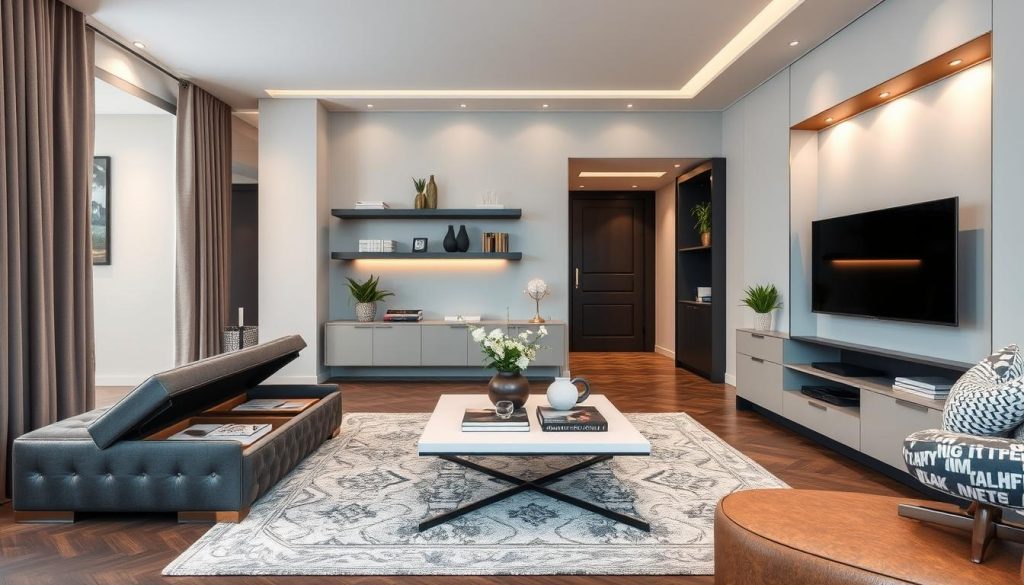
“The secret to a clutter-free home is finding storage solutions that are as beautiful as they are functional.”
Conclusion
Transforming a small living space into a cozy haven is possible. By using space illusions, smart furniture placement, and creative lighting, I can make my space feel bigger. This makes my home more inviting.
Maximizing vertical storage and using mirrors and textiles are key. These tricks help my small space look bigger and more functional. It also shows off my personal style.
Creating a cozy living room in a small apartment takes creativity and patience. But the results are worth it. By using small space living tips, I can make my living area comfortable, stylish, and spacious. It will be a place I love to come home to.

